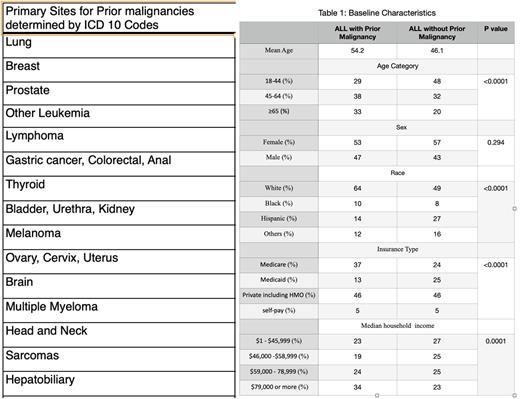Abstract
BACKGROUND: Acute lymphocytic leukemia (ALL) is an aggressive type of leukemia characterized by abundant lymphoblasts or lymphocytes in the bone marrow and peripheral blood. ALL which develops after a prior malignancy occurs in a small subset of ALL and is usually known as secondary ALL. Unlike secondary AML, which is a well-defined entity recognized by the World Health Organization classification, the effect of prior malignancy on the risk of developing and prognosis of ALL is still not well understood. In this study, we aimed to analyze the baseline characteristics and outcomes in hospitalized ALL patients with and without previous malignancy.
METHOD: Nationwide Inpatient Sample (NIS) from 2016-2019 was queried to determine adult hospitalized patients with a primary diagnosis of ALL using ICD-10 codes. Adult patients with a secondary diagnosis of prior malignancies were determined the same way using ICD-10 codes. The primary outcome was defined as the effect of prior malignancy on inpatient mortality in those patients. Secondary outcomes included length of stay (LOS), total hospital charges (THC), health care utilization, kidney injury (AKI), pulmonary embolism (PE), cerebrovascular accidents (CVA), myocardial infarction (MI), platelet and red blood cell (RBC) transfusions, intracranial hemorrhage (ICH) upper and lower GI bleeding (UGIB and LGIB). We evaluated the baseline characteristics using the t-test and chi-square test. Multivariable logistic regression analysis was performed to assess the impact of prior malignancy on ALL for inpatient mortality adjusted by age, gender, race, Charlson index, insurance, and household income.
RESULTS: A total of 24, 355 ALL patients were identified, and 7.1% of these patients had prior malignancies. ALL patients with prior malignancy were older (mean age 54.2 vs. 46.1), more likely to beCaucasian (64% vs. 49%, p <0.0001), more likely to have Medicare, less likely to have Medicaid (37% vs. 24% and 13% vs. 25% respectively, p <0.001), and had higher income (p =0.0001) compared to ALL patients without prior malignancy. In the "ALL with prior malignancy” group, there was a higher proportion of male patients, which was not statistically significant (47% vs. 43. %, p = 0.294) as reflected in Table 1. ALL patients with prior malignancy had a higher Charlson Comorbidity index of ≥ 3 (50.5% vs. 43.1%).
The overall inpatient mortality rate was 5.6% for all patients admitted for ALL; there was no significant difference in mortality rates between ALL with prior malignancy and ALL without prior malignancy (5.6% vs. 5.7% p=0.897). Charlson index, age, and African American race were associated with increased inpatient mortality among hospitalized patients with ALL.
The ALL with prior malignancy group had a higher LOS (19.8 vs. 18.9 days) and lower THC ($269840 vs. $297893) than the other group, which were not statistically significant. Among other secondary outcomes, the presence of prior malignancy was associated with a 52.8% decrease in the odds of upper GI bleeding (p=0.047) and 26% lower occurrence of RBC transfusion (p=0.020), along with 57% more nursing home discharges (adjusted OR 1.57 CI 1.01-2.44, p=0.045). No significant difference was found in the incidence of PE, CVA, AKI, MI, severe sepsis, LGIB, platelet transfusion needs, ICH, ICU transfers, and health care utilizations like home health care.
CONCLUSION: In this analysis, we did not find an increased inpatient mortality in hospitalized ALL patients with prior malignancy compared to de-novo ALL patients. Age, higher Charlson index, African-American race were associated with inpatient mortality in ALL admissions. Mainly, the Caucasian race, insurance type, and household income were found to be associated with secondary ALL development after prior malignancy. These data suggest socioeconomic and racial disparity could have an impact on the development of secondary ALL. Further studies should be considered to explore a molecular basis for this difference.
Disclosures
No relevant conflicts of interest to declare.
Author notes
Asterisk with author names denotes non-ASH members.


This feature is available to Subscribers Only
Sign In or Create an Account Close Modal